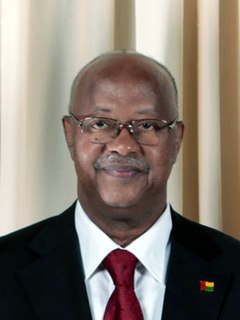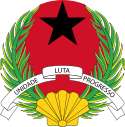
Politics of Guinea-Bissau takes place in a framework of a semi-presidential representative democratic republic in transition, whereby the President is head of state and the Prime Minister is head of government, and of a multi-party system. Executive power is exercised by the government. Legislative power is vested in both the government and the National People's Assembly.

Carlos Domingos Gomes Júnior is a Guinea-Bissauan politician who was Prime Minister of Guinea-Bissau from 10 May 2004 to 2 November 2005, and again from 25 December 2008 to 10 February 2012. He has been the President of the African Party for the Independence of Guinea and Cape Verde (PAIGC) since 2002 and is widely known as "Cadogo". He resigned as prime minister on 10 February 2012 to run in the presidential election triggered by President Malam Bacai Sanhá's death on 9 January.

Elections in Benin take place within the framework of a multi-party democracy and a presidential system. Both the President and the National Assembly are directly elected by voters, with elections organised by the Autonomous National Electoral Commission (CENA).

Elections in Guinea-Bissau take place within the framework of a multi-party democracy and a semi-presidential system. Both the President and the National People's Assembly are directly elected by voters.

General elections were held in the Central African Republic on March 13, 2005 to elect the President and National Assembly. A second round was held for both elections on May 8, marking the end of the transitional process that began with the seizure of power by François Bozizé in a March 2003 coup, overthrowing President Ange-Félix Patassé. A new constitution was approved in a referendum in December 2004 and took effect the same month.

Presidential elections were held in Guinea-Bissau on 19 June 2005, with a second round runoff on 24 July. The elections marked the end of a transition to democratic rule after the previously elected government was overthrown in a September 2003 military coup led by General Veríssimo Correia Seabra. The result was a victory for former President and independent candidate João Bernardo Vieira.
The Party for Social Renewal is a political party in Guinea-Bissau. It is one of the country's leading parties and is currently the main opposition party.

A presidential election was held in Mauritania on 18 July 2009. Mohamed Ould Abdel Aziz, who led the 2008 coup d'état, won a narrow first-round majority in the election, according to official results. A second round, if necessary, would have been held on 1 August 2009.

General elections were held in the Central African Republic on 23 January 2011 to elect the President and National Assembly, having been postponed numerous times. Incumbent President François Bozizé was re-elected for a second term in the first round of voting, receiving 66% of the vote. The organization of the elections was plagued by difficulties, and the opposition repeatedly demanded its postponement. Ultimately it was delayed until January 2011, requiring an extension of the terms of both the President and the National Assembly.

Raimundo Pereira is a Guinea-Bissauan lawyer and politician who was interim President of Guinea-Bissau from 3 March 2009 to 8 September 2009 and again in 2012, following the departure of President Malam Bacai Sanhá for medical treatment abroad; he continued in that capacity after Sanha's death. Pereira was elected as President of the National People's Assembly on 22 December 2008. Pereira is a member of the African Party for the Independence of Guinea and Cape Verde (PAIGC). He was ousted in a coup on 12 April 2012 and succeeded by Mamadu Ture Kuruma.

Presidential elections were held in Guinea-Bissau on 28 June 2009 following the assassination of President João Bernardo Vieira on 2 March 2009. As no candidate won a majority in the first round, a second round was held on 26 July 2009 between the two leading candidates, Malam Bacai Sanhá of the governing African Party for the Independence of Guinea and Cape Verde (PAIGC) and opposition leader Kumba Ialá. Sanhá won with a substantial majority in the second round, according to official results.

The United Nations Integrated Peacebuilding Office in Guinea-Bissau (UNIOGBIS) is a United Nations peacebuilding mission in Guinea-Bissau.

Presidential elections were held in Guinea-Bissau on 18 March 2012 following the death of President Malam Bacai Sanhá on 9 January. A run-off was set to be held on 29 April after being postponed by a week as announced by electoral commission chief Desejado Lima Dacosta. However, after a military coup, the leading candidates were arrested and the election was cancelled. The junta's spokesman then announced plans to hold an election in two years, despite condemnation. General elections were subsequently held in April 2014.

General elections were held in Niger on 31 January 2011 to elect the President and National Assembly, with a second round of the presidential elections on 12 March. The first round of the presidential elections was originally scheduled to be held on 3 January and the second round on 31 January, but was later postponed. The elections followed a military coup in February 2010 that ousted President Mamadou Tandja.

Legislative elections were held in Guinea-Bissau on 10 March 2019. They were originally scheduled for 18 November 2018 following an ECOWAS brokered agreement between President José Mário Vaz and the opposition in April 2018, but the electoral census was not completed until 20 November, and Prime Minister Aristides Gomes subsequently proposed 16 December, 30 December, or 27 January 2019 as possible alternative dates. The election date was settled following a presidential decree issued in December 2018.

This national electoral calendar for the year 2019 lists the national/federal direct elections to be held in 2019 in all sovereign states and their dependent territories. By-elections are excluded, though national referendums are included. Specific dates are given where they have been known.


















